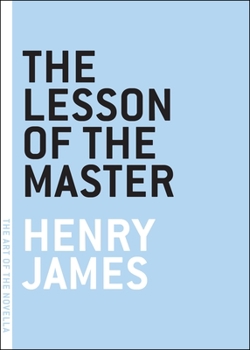The Lesson of the Master
Select Format
Select Condition 
Book Overview
"You know as well as you sit there that you'd put a pistol-ball into your brain if you had written my books " Exemplifying Henry James's famous belief that "Art makes life," The Lesson of the Master is a piercing study of the life that art makes. When the tale's protagonist--a gifted young writer--meets and befriends a famous author he has long idolized, he is both repelled by and attracted to the artist's great secret: the emotional costs of a life dedicated to art. With extraordinary psychological insight and devastating wit, the novella asks the question of whether art is, ultimately, demeaning or ennobling for the artist, while capturing the ambiguities of a life devoted to art, and the choices artists must make. The expatriate James knew these choice well by the time he published the novella in the Universal Review in 1888, and the work reveals him at the height of his powers. The Art of The Novella Series Too short to be a novel, too long to be a short story, the novella is generally unrecognized by academics and publishers. Nonetheless, it is a form beloved and practiced by literature's greatest writers. In the Art Of The Novella series, Melville House celebrates this renegade art form and its practitioners with titles that are, in many instances, presented in book form for the first time.
Format:Paperback
Language:English
ISBN:0974607843
ISBN13:9780974607849
Release Date:May 2004
Publisher:Melville House Publishing
Length:122 Pages
Weight:0.30 lbs.
Dimensions:0.4" x 5.1" x 7.0"
Customer Reviews
1 rating
Both Stories Have Surprise Endings - Read the Reviews Later
Published by Thriftbooks.com User , 18 years ago
My review pertains to The Turn of the Screw & The Lesson of the Master by Henry James, published by Prometheus Books (1996). The Turn of the Screw makes up the first 134 pages; The Lesson of the Master is considerably shorter, only 74 pages. There is a short, general overview of the career of Henry James, but no specific analysis of either of the two stories is provided. The Lesson of the Master (1892): The young writer Paul Overt deeply admires the highly respected novelist Henry St. George, although Overt does recognize that while the latest works by St. George are quite good, they are lacking in that spark of genius found in his earlier novels. In turn, St. George recognizes the potential for greatness in Paul Overt, a potential that can only be achieved if Overt is willing to sacrifice everything - even his growing attraction, perhaps love - for a vivacious, intellectual, stimulating, young woman. St. George himself is married and with two successful sons, and argues that the true artist can never achieve greatness if he becomes distracted by marriage and family. He does not regret his own choice, but he stresses that Overt must make this decision for himself. The Lesson of the Master is perhaps less complex, and less ambiguous than other works by Henry James, but the ending offers both surprise and irony. The consequences of Paul Overt's choice are unexpected. The Turn of Screw(1898): A reader new to this classic work should read no reviews, no essays, no forwards, and no prefaces. I made that mistake. Without going into details, my first reading of The Turn of the Screw was unduly influenced by my knowing too much too soon. There will be plenty of time after your first reading to immerse yourself in literary criticism and reader reviews. The primary interpretation is straight-forward. Henry James clearly intended The Turn of the Screw to be just what it seems to be: a well-constructed, frightening, bona fide ghost story. There is much evidence for this argument including various notes and letters written by Henry James himself. Most readers probably subscribe to this view on their first reading. A second interpretation challenges the veracity of the story teller, the children's governess, arguing that the ghosts are bizarre imaginings, hallucinations, of a mentally disturbed young woman. While early criticism was founded on newly popular Freudian analysis, later supporters of this interpretation focused largely on inconsistencies in her account. Critics also point to supporting evidence in Henry James's sometimes ambiguous notes and letters. It is quite remarkable that after a century of literary criticism there is still no agreement among general readers, nor among scholars. The Turn of the Screw is a work of genius, a genius that likely had considerable enjoyment developing this complex tale. James has seemingly done the impossible: he created an exceptionally good ghost story while simultaneously leaving subtle evidence for






